Effective Communication Skills and Strategies in Workplace Management
VerifiedAdded on 2022/11/10
|7
|1526
|296
Essay
AI Summary
This essay delves into the critical role of communication skills in the workplace, emphasizing their impact on effective strategy implementation. It explores various communication strategies, including verbal, written, and nonverbal communication, as well as active listening and the importance of open dialogue. The essay highlights the significance of fostering a positive work environment, encouraging employee engagement, and providing communication training modules to enhance employee capabilities. It underscores the need for clear and concise communication between all levels of management and employees, fostering a culture of trust and collaboration. The essay also examines the role of feedback, conflict resolution, and building strong relationships within the organization. The conclusion reinforces the importance of communication skills and the strategies for a more effective workplace.
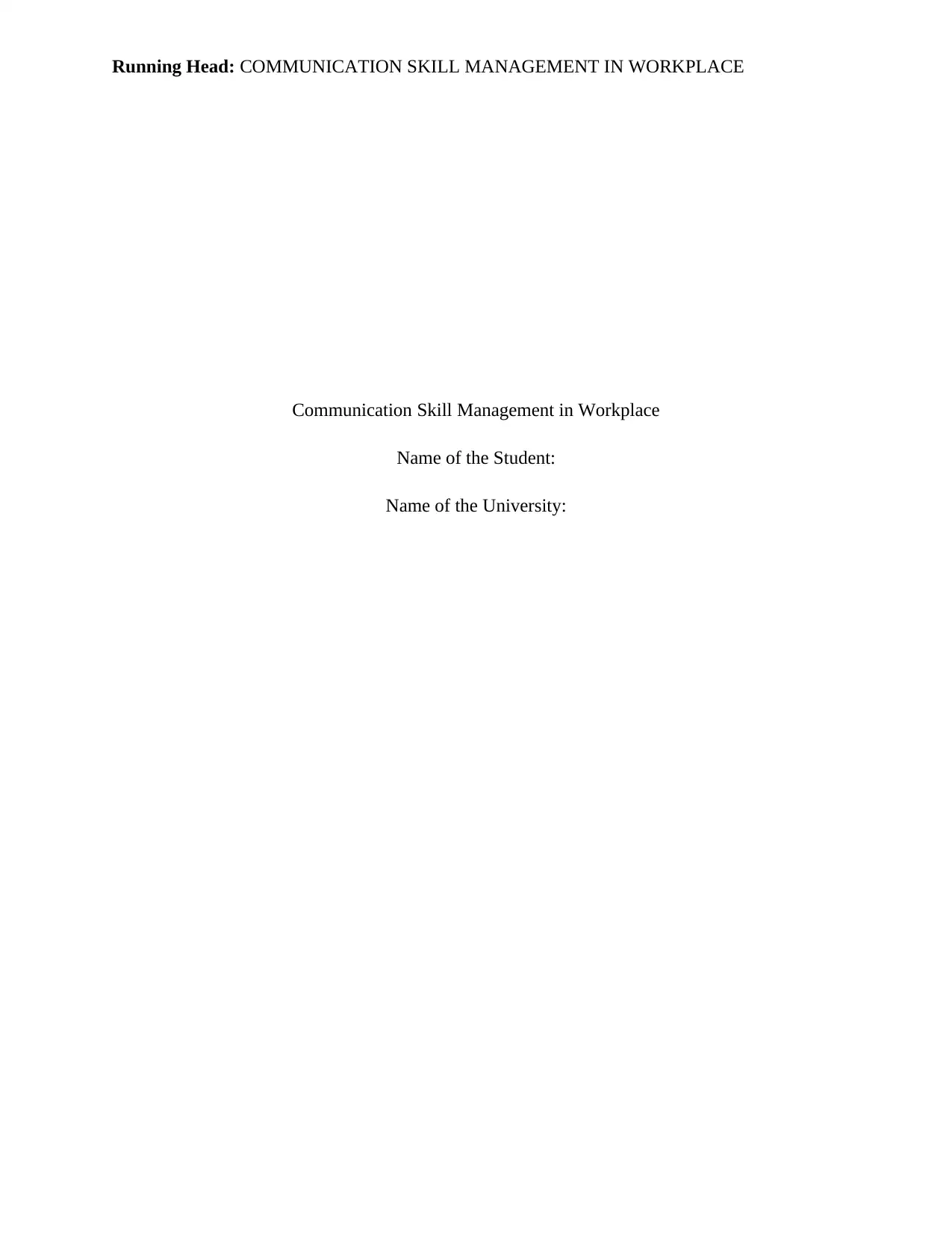
Running Head: COMMUNICATION SKILL MANAGEMENT IN WORKPLACE
Communication Skill Management in Workplace
Name of the Student:
Name of the University:
Communication Skill Management in Workplace
Name of the Student:
Name of the University:
Paraphrase This Document
Need a fresh take? Get an instant paraphrase of this document with our AI Paraphraser
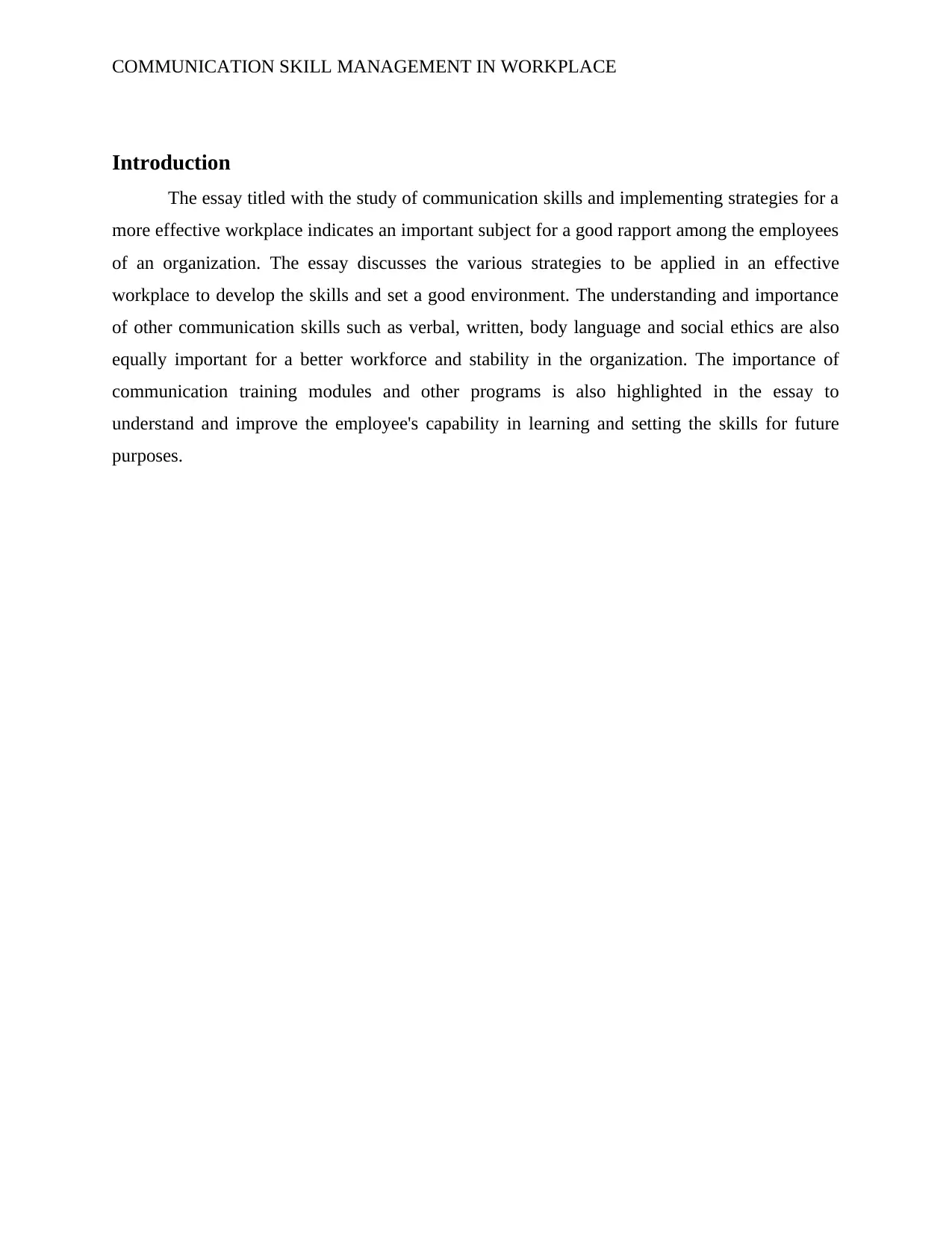
COMMUNICATION SKILL MANAGEMENT IN WORKPLACE
Introduction
The essay titled with the study of communication skills and implementing strategies for a
more effective workplace indicates an important subject for a good rapport among the employees
of an organization. The essay discusses the various strategies to be applied in an effective
workplace to develop the skills and set a good environment. The understanding and importance
of other communication skills such as verbal, written, body language and social ethics are also
equally important for a better workforce and stability in the organization. The importance of
communication training modules and other programs is also highlighted in the essay to
understand and improve the employee's capability in learning and setting the skills for future
purposes.
Introduction
The essay titled with the study of communication skills and implementing strategies for a
more effective workplace indicates an important subject for a good rapport among the employees
of an organization. The essay discusses the various strategies to be applied in an effective
workplace to develop the skills and set a good environment. The understanding and importance
of other communication skills such as verbal, written, body language and social ethics are also
equally important for a better workforce and stability in the organization. The importance of
communication training modules and other programs is also highlighted in the essay to
understand and improve the employee's capability in learning and setting the skills for future
purposes.
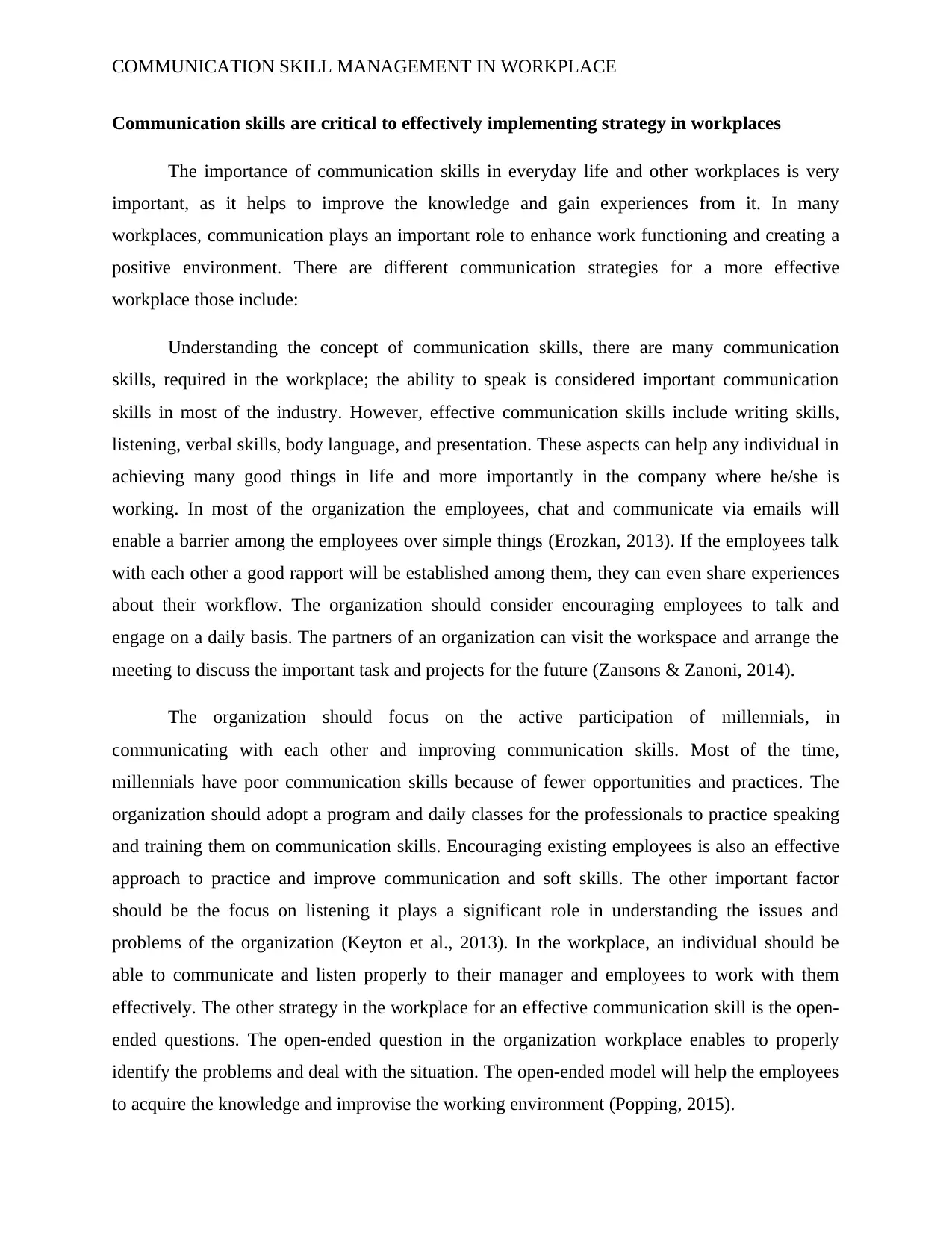
COMMUNICATION SKILL MANAGEMENT IN WORKPLACE
Communication skills are critical to effectively implementing strategy in workplaces
The importance of communication skills in everyday life and other workplaces is very
important, as it helps to improve the knowledge and gain experiences from it. In many
workplaces, communication plays an important role to enhance work functioning and creating a
positive environment. There are different communication strategies for a more effective
workplace those include:
Understanding the concept of communication skills, there are many communication
skills, required in the workplace; the ability to speak is considered important communication
skills in most of the industry. However, effective communication skills include writing skills,
listening, verbal skills, body language, and presentation. These aspects can help any individual in
achieving many good things in life and more importantly in the company where he/she is
working. In most of the organization the employees, chat and communicate via emails will
enable a barrier among the employees over simple things (Erozkan, 2013). If the employees talk
with each other a good rapport will be established among them, they can even share experiences
about their workflow. The organization should consider encouraging employees to talk and
engage on a daily basis. The partners of an organization can visit the workspace and arrange the
meeting to discuss the important task and projects for the future (Zansons & Zanoni, 2014).
The organization should focus on the active participation of millennials, in
communicating with each other and improving communication skills. Most of the time,
millennials have poor communication skills because of fewer opportunities and practices. The
organization should adopt a program and daily classes for the professionals to practice speaking
and training them on communication skills. Encouraging existing employees is also an effective
approach to practice and improve communication and soft skills. The other important factor
should be the focus on listening it plays a significant role in understanding the issues and
problems of the organization (Keyton et al., 2013). In the workplace, an individual should be
able to communicate and listen properly to their manager and employees to work with them
effectively. The other strategy in the workplace for an effective communication skill is the open-
ended questions. The open-ended question in the organization workplace enables to properly
identify the problems and deal with the situation. The open-ended model will help the employees
to acquire the knowledge and improvise the working environment (Popping, 2015).
Communication skills are critical to effectively implementing strategy in workplaces
The importance of communication skills in everyday life and other workplaces is very
important, as it helps to improve the knowledge and gain experiences from it. In many
workplaces, communication plays an important role to enhance work functioning and creating a
positive environment. There are different communication strategies for a more effective
workplace those include:
Understanding the concept of communication skills, there are many communication
skills, required in the workplace; the ability to speak is considered important communication
skills in most of the industry. However, effective communication skills include writing skills,
listening, verbal skills, body language, and presentation. These aspects can help any individual in
achieving many good things in life and more importantly in the company where he/she is
working. In most of the organization the employees, chat and communicate via emails will
enable a barrier among the employees over simple things (Erozkan, 2013). If the employees talk
with each other a good rapport will be established among them, they can even share experiences
about their workflow. The organization should consider encouraging employees to talk and
engage on a daily basis. The partners of an organization can visit the workspace and arrange the
meeting to discuss the important task and projects for the future (Zansons & Zanoni, 2014).
The organization should focus on the active participation of millennials, in
communicating with each other and improving communication skills. Most of the time,
millennials have poor communication skills because of fewer opportunities and practices. The
organization should adopt a program and daily classes for the professionals to practice speaking
and training them on communication skills. Encouraging existing employees is also an effective
approach to practice and improve communication and soft skills. The other important factor
should be the focus on listening it plays a significant role in understanding the issues and
problems of the organization (Keyton et al., 2013). In the workplace, an individual should be
able to communicate and listen properly to their manager and employees to work with them
effectively. The other strategy in the workplace for an effective communication skill is the open-
ended questions. The open-ended question in the organization workplace enables to properly
identify the problems and deal with the situation. The open-ended model will help the employees
to acquire the knowledge and improvise the working environment (Popping, 2015).
⊘ This is a preview!⊘
Do you want full access?
Subscribe today to unlock all pages.

Trusted by 1+ million students worldwide
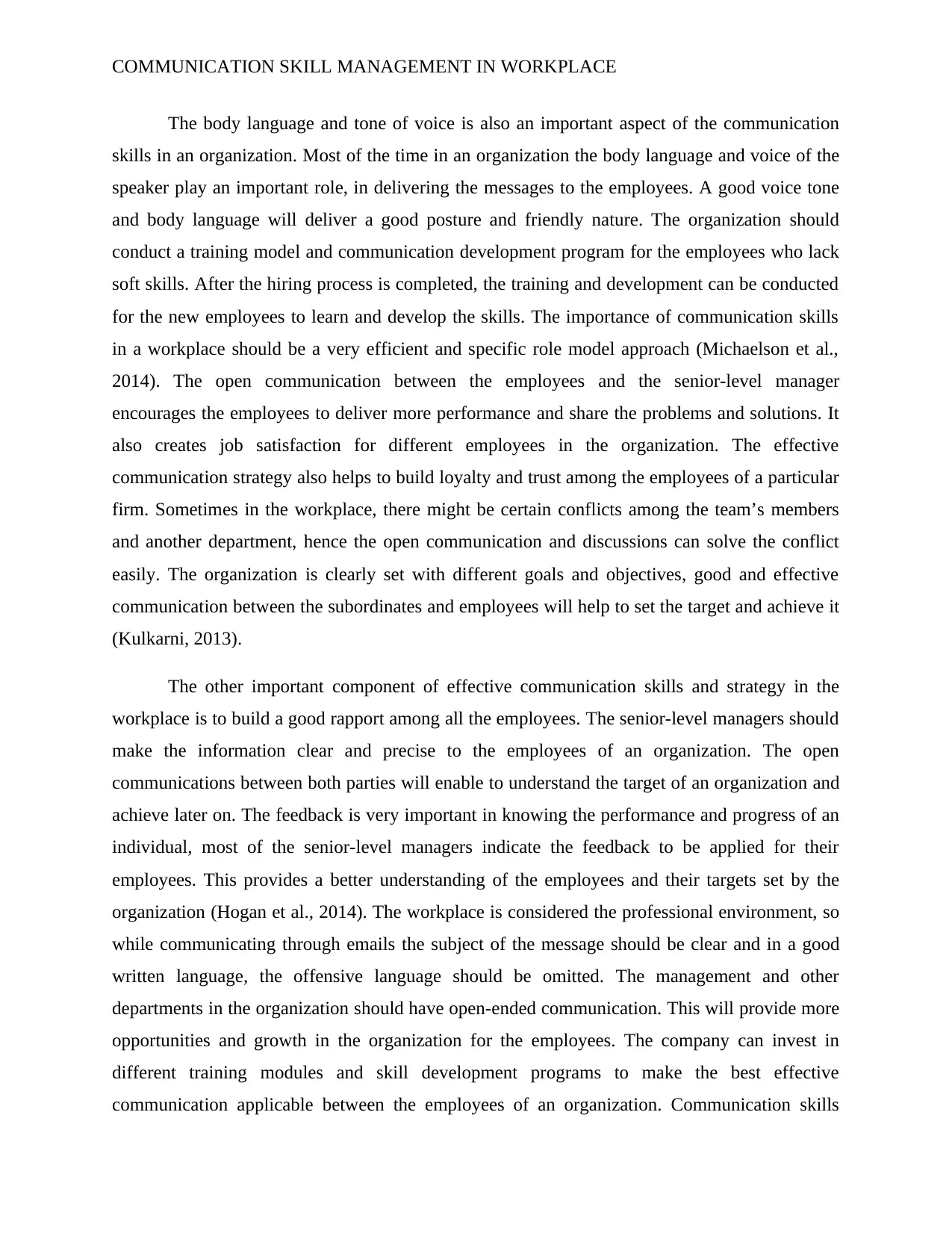
COMMUNICATION SKILL MANAGEMENT IN WORKPLACE
The body language and tone of voice is also an important aspect of the communication
skills in an organization. Most of the time in an organization the body language and voice of the
speaker play an important role, in delivering the messages to the employees. A good voice tone
and body language will deliver a good posture and friendly nature. The organization should
conduct a training model and communication development program for the employees who lack
soft skills. After the hiring process is completed, the training and development can be conducted
for the new employees to learn and develop the skills. The importance of communication skills
in a workplace should be a very efficient and specific role model approach (Michaelson et al.,
2014). The open communication between the employees and the senior-level manager
encourages the employees to deliver more performance and share the problems and solutions. It
also creates job satisfaction for different employees in the organization. The effective
communication strategy also helps to build loyalty and trust among the employees of a particular
firm. Sometimes in the workplace, there might be certain conflicts among the team’s members
and another department, hence the open communication and discussions can solve the conflict
easily. The organization is clearly set with different goals and objectives, good and effective
communication between the subordinates and employees will help to set the target and achieve it
(Kulkarni, 2013).
The other important component of effective communication skills and strategy in the
workplace is to build a good rapport among all the employees. The senior-level managers should
make the information clear and precise to the employees of an organization. The open
communications between both parties will enable to understand the target of an organization and
achieve later on. The feedback is very important in knowing the performance and progress of an
individual, most of the senior-level managers indicate the feedback to be applied for their
employees. This provides a better understanding of the employees and their targets set by the
organization (Hogan et al., 2014). The workplace is considered the professional environment, so
while communicating through emails the subject of the message should be clear and in a good
written language, the offensive language should be omitted. The management and other
departments in the organization should have open-ended communication. This will provide more
opportunities and growth in the organization for the employees. The company can invest in
different training modules and skill development programs to make the best effective
communication applicable between the employees of an organization. Communication skills
The body language and tone of voice is also an important aspect of the communication
skills in an organization. Most of the time in an organization the body language and voice of the
speaker play an important role, in delivering the messages to the employees. A good voice tone
and body language will deliver a good posture and friendly nature. The organization should
conduct a training model and communication development program for the employees who lack
soft skills. After the hiring process is completed, the training and development can be conducted
for the new employees to learn and develop the skills. The importance of communication skills
in a workplace should be a very efficient and specific role model approach (Michaelson et al.,
2014). The open communication between the employees and the senior-level manager
encourages the employees to deliver more performance and share the problems and solutions. It
also creates job satisfaction for different employees in the organization. The effective
communication strategy also helps to build loyalty and trust among the employees of a particular
firm. Sometimes in the workplace, there might be certain conflicts among the team’s members
and another department, hence the open communication and discussions can solve the conflict
easily. The organization is clearly set with different goals and objectives, good and effective
communication between the subordinates and employees will help to set the target and achieve it
(Kulkarni, 2013).
The other important component of effective communication skills and strategy in the
workplace is to build a good rapport among all the employees. The senior-level managers should
make the information clear and precise to the employees of an organization. The open
communications between both parties will enable to understand the target of an organization and
achieve later on. The feedback is very important in knowing the performance and progress of an
individual, most of the senior-level managers indicate the feedback to be applied for their
employees. This provides a better understanding of the employees and their targets set by the
organization (Hogan et al., 2014). The workplace is considered the professional environment, so
while communicating through emails the subject of the message should be clear and in a good
written language, the offensive language should be omitted. The management and other
departments in the organization should have open-ended communication. This will provide more
opportunities and growth in the organization for the employees. The company can invest in
different training modules and skill development programs to make the best effective
communication applicable between the employees of an organization. Communication skills
Paraphrase This Document
Need a fresh take? Get an instant paraphrase of this document with our AI Paraphraser
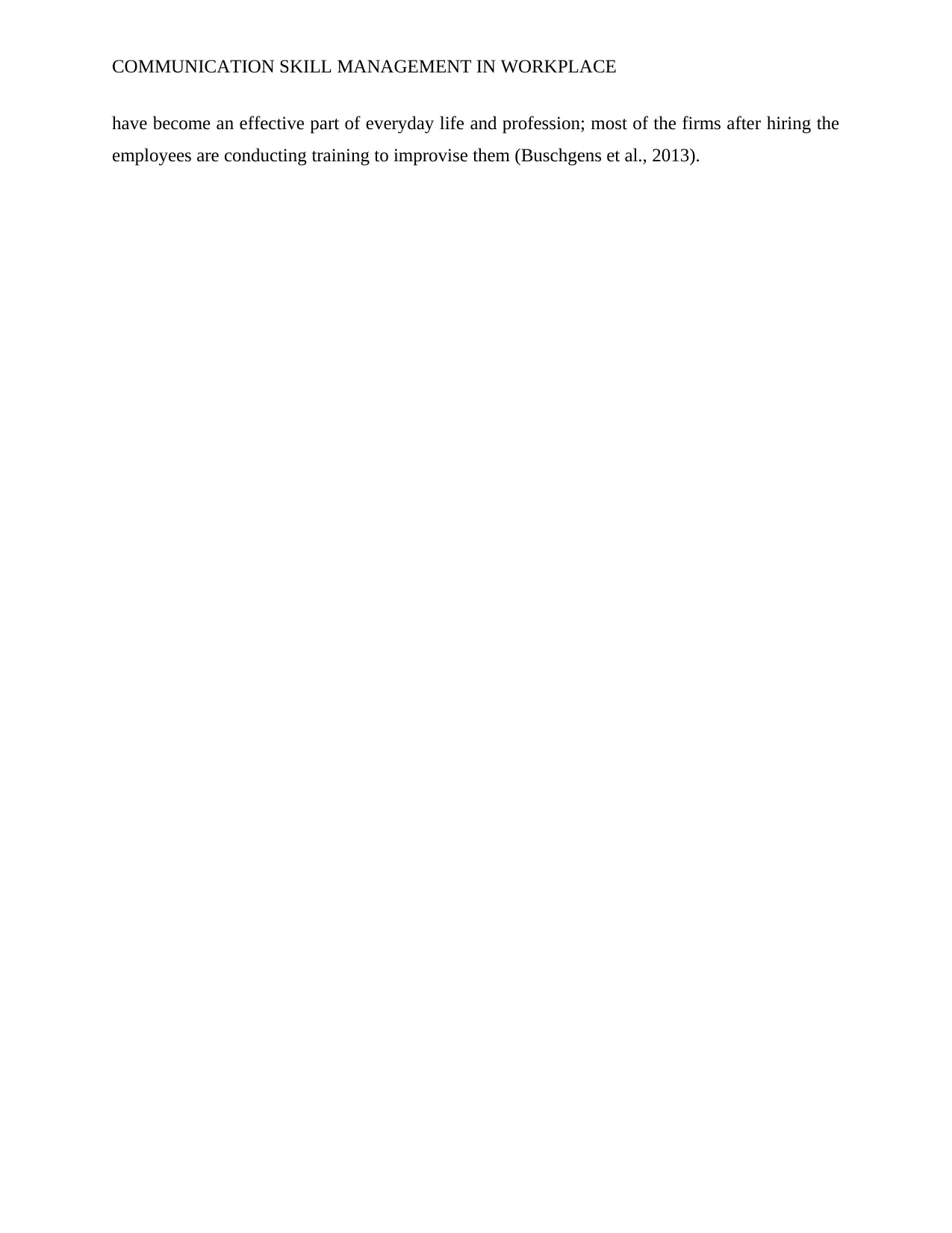
COMMUNICATION SKILL MANAGEMENT IN WORKPLACE
have become an effective part of everyday life and profession; most of the firms after hiring the
employees are conducting training to improvise them (Buschgens et al., 2013).
have become an effective part of everyday life and profession; most of the firms after hiring the
employees are conducting training to improvise them (Buschgens et al., 2013).
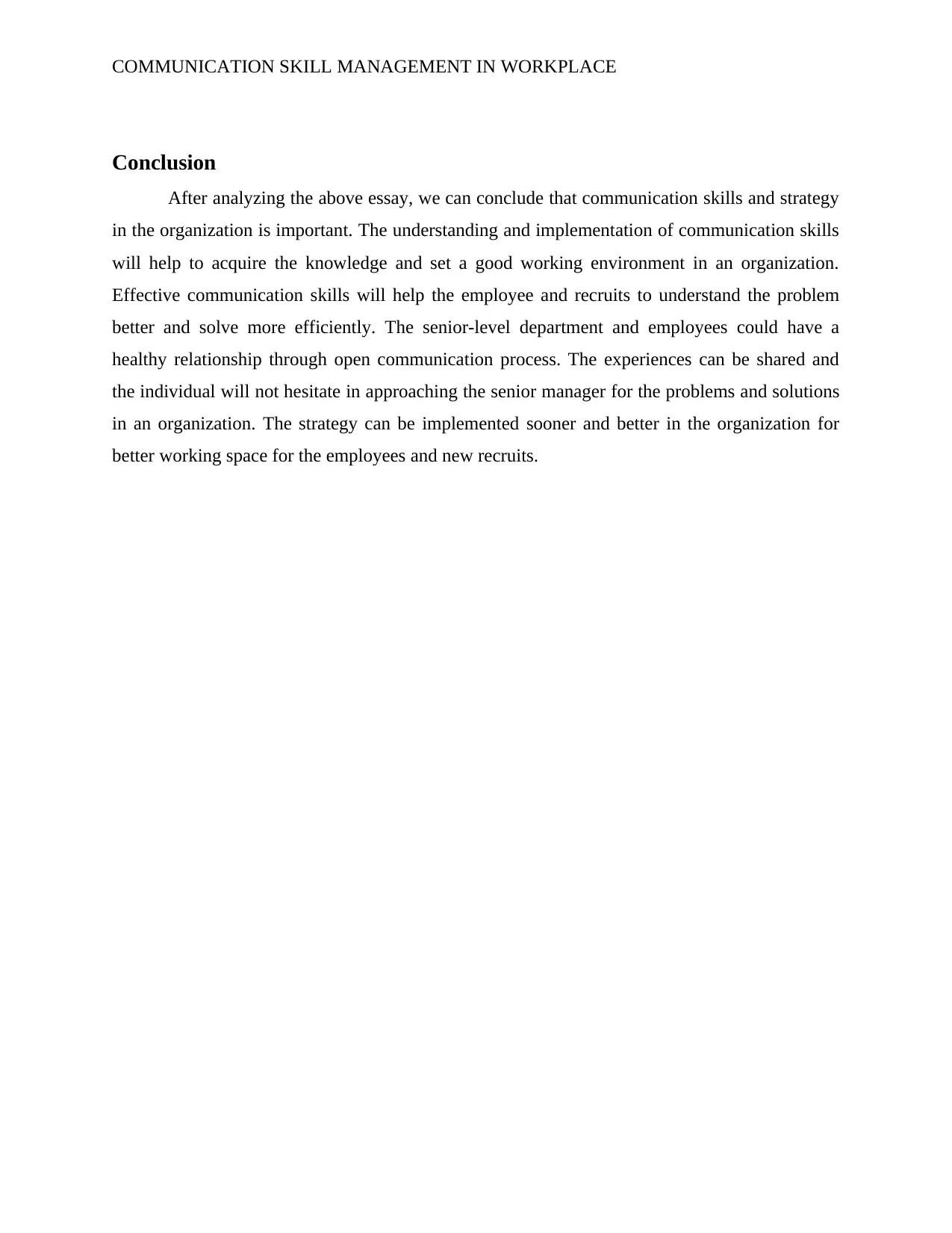
COMMUNICATION SKILL MANAGEMENT IN WORKPLACE
Conclusion
After analyzing the above essay, we can conclude that communication skills and strategy
in the organization is important. The understanding and implementation of communication skills
will help to acquire the knowledge and set a good working environment in an organization.
Effective communication skills will help the employee and recruits to understand the problem
better and solve more efficiently. The senior-level department and employees could have a
healthy relationship through open communication process. The experiences can be shared and
the individual will not hesitate in approaching the senior manager for the problems and solutions
in an organization. The strategy can be implemented sooner and better in the organization for
better working space for the employees and new recruits.
Conclusion
After analyzing the above essay, we can conclude that communication skills and strategy
in the organization is important. The understanding and implementation of communication skills
will help to acquire the knowledge and set a good working environment in an organization.
Effective communication skills will help the employee and recruits to understand the problem
better and solve more efficiently. The senior-level department and employees could have a
healthy relationship through open communication process. The experiences can be shared and
the individual will not hesitate in approaching the senior manager for the problems and solutions
in an organization. The strategy can be implemented sooner and better in the organization for
better working space for the employees and new recruits.
⊘ This is a preview!⊘
Do you want full access?
Subscribe today to unlock all pages.

Trusted by 1+ million students worldwide
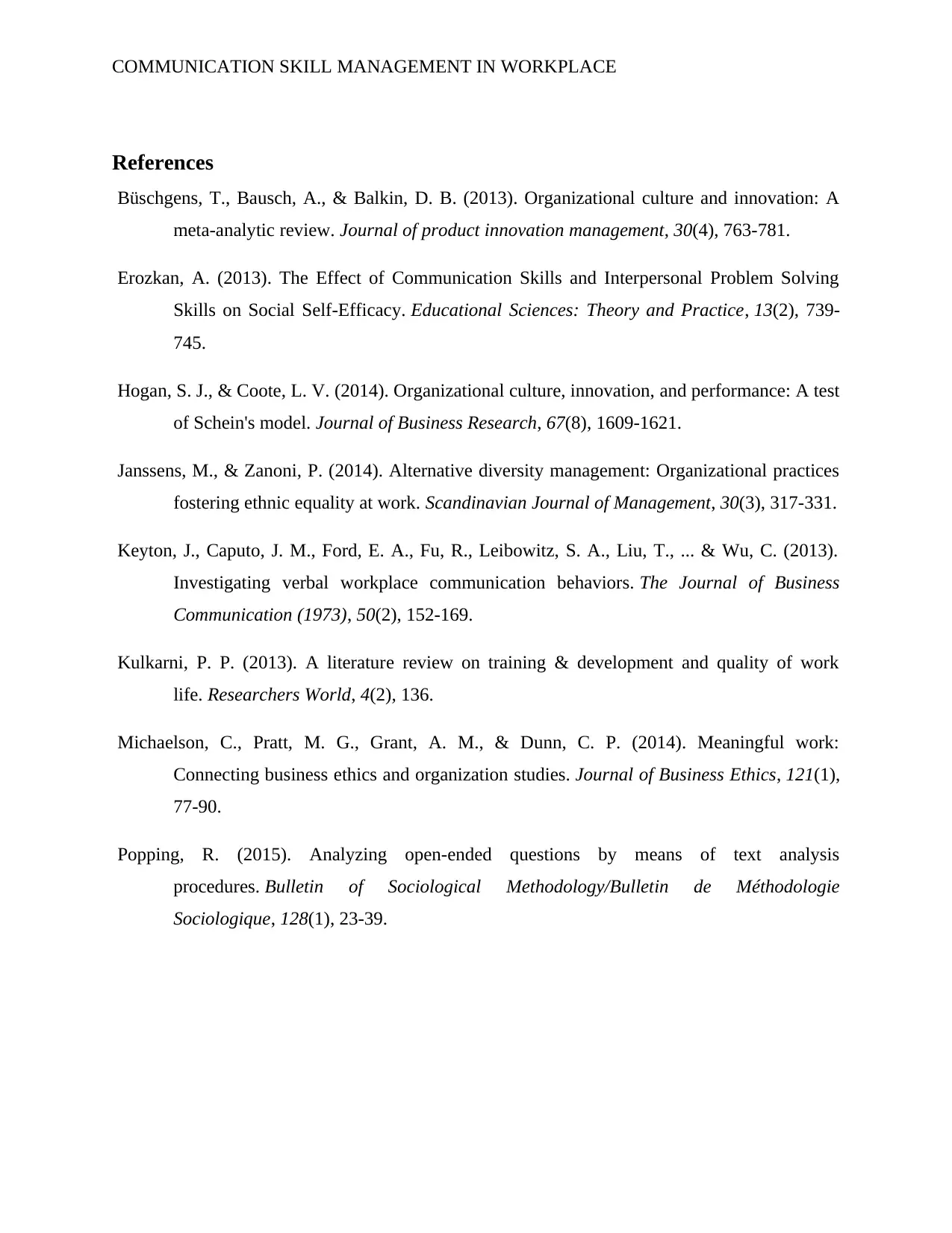
COMMUNICATION SKILL MANAGEMENT IN WORKPLACE
References
Büschgens, T., Bausch, A., & Balkin, D. B. (2013). Organizational culture and innovation: A
meta‐analytic review. Journal of product innovation management, 30(4), 763-781.
Erozkan, A. (2013). The Effect of Communication Skills and Interpersonal Problem Solving
Skills on Social Self-Efficacy. Educational Sciences: Theory and Practice, 13(2), 739-
745.
Hogan, S. J., & Coote, L. V. (2014). Organizational culture, innovation, and performance: A test
of Schein's model. Journal of Business Research, 67(8), 1609-1621.
Janssens, M., & Zanoni, P. (2014). Alternative diversity management: Organizational practices
fostering ethnic equality at work. Scandinavian Journal of Management, 30(3), 317-331.
Keyton, J., Caputo, J. M., Ford, E. A., Fu, R., Leibowitz, S. A., Liu, T., ... & Wu, C. (2013).
Investigating verbal workplace communication behaviors. The Journal of Business
Communication (1973), 50(2), 152-169.
Kulkarni, P. P. (2013). A literature review on training & development and quality of work
life. Researchers World, 4(2), 136.
Michaelson, C., Pratt, M. G., Grant, A. M., & Dunn, C. P. (2014). Meaningful work:
Connecting business ethics and organization studies. Journal of Business Ethics, 121(1),
77-90.
Popping, R. (2015). Analyzing open-ended questions by means of text analysis
procedures. Bulletin of Sociological Methodology/Bulletin de Méthodologie
Sociologique, 128(1), 23-39.
References
Büschgens, T., Bausch, A., & Balkin, D. B. (2013). Organizational culture and innovation: A
meta‐analytic review. Journal of product innovation management, 30(4), 763-781.
Erozkan, A. (2013). The Effect of Communication Skills and Interpersonal Problem Solving
Skills on Social Self-Efficacy. Educational Sciences: Theory and Practice, 13(2), 739-
745.
Hogan, S. J., & Coote, L. V. (2014). Organizational culture, innovation, and performance: A test
of Schein's model. Journal of Business Research, 67(8), 1609-1621.
Janssens, M., & Zanoni, P. (2014). Alternative diversity management: Organizational practices
fostering ethnic equality at work. Scandinavian Journal of Management, 30(3), 317-331.
Keyton, J., Caputo, J. M., Ford, E. A., Fu, R., Leibowitz, S. A., Liu, T., ... & Wu, C. (2013).
Investigating verbal workplace communication behaviors. The Journal of Business
Communication (1973), 50(2), 152-169.
Kulkarni, P. P. (2013). A literature review on training & development and quality of work
life. Researchers World, 4(2), 136.
Michaelson, C., Pratt, M. G., Grant, A. M., & Dunn, C. P. (2014). Meaningful work:
Connecting business ethics and organization studies. Journal of Business Ethics, 121(1),
77-90.
Popping, R. (2015). Analyzing open-ended questions by means of text analysis
procedures. Bulletin of Sociological Methodology/Bulletin de Méthodologie
Sociologique, 128(1), 23-39.
1 out of 7
Related Documents
Your All-in-One AI-Powered Toolkit for Academic Success.
+13062052269
info@desklib.com
Available 24*7 on WhatsApp / Email
![[object Object]](/_next/static/media/star-bottom.7253800d.svg)
Unlock your academic potential
Copyright © 2020–2025 A2Z Services. All Rights Reserved. Developed and managed by ZUCOL.





